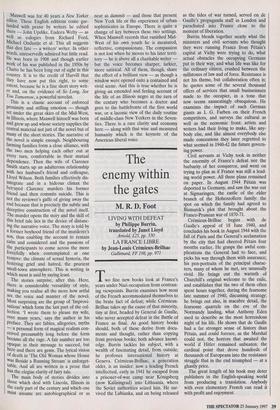The enemy within the gates
M. R. D. Foot Two fine new books look at France's years under Nazi occupation from contrast- ing viewpoints. Burrin examines how most of the French accommodated themselves to the brute fact of defeat; while Crenaieux- Brilhac takes up the cause of that minority, tiny at first, headed by General de Gaulle, who never accepted defeat in the Battle of France as final. As good history books should, both of these derive from docu- ments and thought, rather than copying from previous books; both advance knowl- edge. Burrin tackles his subject, with a wealth of fascinating detail, from outside; he professes international history at Geneva. Crernieux-Brilhac, a generation older, is an insider: now a leading French intellectual, early in 1941 he escaped from a prisoner-of-war camp near Konigsberg (now Kaliningrad) into Lithuania, where the Soviet authorities seized him. He sur- vived the Lubianka, and on being released as the tides of war turned, served on de Gaulle's propaganda staff in London and parachuted into France close to the moment of liberation.
Burrin blends together neatly what the ministers and civil servants who thought they were running France from Petain's capital at Vichy were trying to do, what actual obstacles the occupying Germans put in their way, and what life was like for the ordinary citizen, crushed between the millstones of law and of force. Resistance is not his theme, but collaboration often is; he quotes some of the several thousand offers of services that small businessmen made to the occupier, in a tone that now seems nauseatingly obsequious. He examines the impact of such German giants as I. G. Farben on their French competitors, and surveys the cultural as well as the economic front: artists and writers had their living to make, like any- body else, and like almost everybody else made concessions they later regretted to what seemed in 1940-42 the future govern- ing power. Civil servants at Vichy took in neither the enormity of France's defeat nor the barbarity of her conqueror, and went on trying to plan as if France was still a lead- ing world power. All these plans remained on paper. In August 1944 Petain was deported to Germany, and saw the war out at Sigmaringen, the castle of the elder branch of the Hohenzollern family: the spot on which the family had agreed to Bismarck's plot that brought about the Franco-Prussian war of 1870-71.
Cremieux-Brilhac begins with de Gaulle's appeal of 18 June 1940, and concludes his book in August 1944 with the fall of Paris and the General's acclamation by the city that had cheered Main four months earlier. He grasps the awful com- plications the General had to face, and picks his way through them with assurance; his pen-portraits of the principal charac- ters, many of whom he met, are unusually vivid. He brings out the warmth of Churchill's original welcome to the exile, and establishes that the two of them often spent hours together, during the fearsome late summer of 1940, discussing strategy; he brings out also, in macabre detail, the fearsome quarrels on the eve of the Normandy landing, what Anthony Eden used to describe as the most horrendous night of his life. He shows that de Gaulle had a far stronger sense of history than Petain, and could foresee, as the Marshal could not, the horrors that awaited the world if Hitler remained unbeaten: the cardinal point that drove hundreds of thousands of Europeans into the resistance struggle that in the end triumphed — at a ghastly price.
The great length of his book may deter publishers in the English-speaking world from producing a translation. Anybody with even elementary French can read it with profit and enjoyment.


































































 Previous page
Previous page